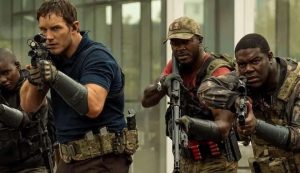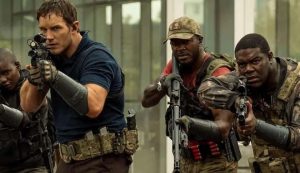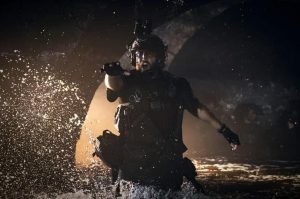The Terminal List (2022)

Based on the best-selling novel by former Navy SEAL Jack Carr, “The Terminal List” is an action-packed, revenge-driven series that follows Lieutenant Commander James Reece (Chris Pratt) as he uncovers a government conspiracy following a disastrous covert mission. The series, released on Amazon Prime Video, marks a notable shift for Pratt, known for his comedic roles, into more serious and gritty territory. Directed by Antoine Fuqua and created by David DiGilio, the show aims to combine intense military action with psychological drama, exploring themes of betrayal, trauma, and redemption.
Suggested videos for you:
Plot and Characters
The story begins with Reece’s SEAL team being ambushed during a high-stakes mission, leaving only him as the sole survivor. Wracked with guilt and suffering from PTSD, Reece returns home, only to discover that there are inconsistencies in his memories of the events. When his family is brutally murdered, Reece embarks on a bloody path of vengeance, determined to take down the people responsible. The plot grows increasingly complex, revealing layers of deception involving pharmaceutical companies, military officials, and government agencies.
Pratt’s portrayal of Reece as a hardened soldier seeking retribution marks a drastic departure from his typical light-hearted, comedic performances. He carries the character’s trauma and transformation convincingly, playing Reece as a man driven to the edge by betrayal and loss. His progression from a broken man grieving his family to a relentless force of vengeance is one of the show’s key strengths. Yet, while Pratt’s performance is solid, the character is written with a somewhat one-dimensional focus on revenge, which limits the emotional depth that the series could have explored further.
Supporting characters, including Taylor Kitsch as Reece’s best friend Ben Edwards and Constance Wu as journalist Katie Buranek, add depth to the narrative. Wu, in particular, brings a strong presence as someone trying to help Reece while keeping a moral compass amidst the chaos. However, some of the secondary characters fall into predictable tropes typical of the genre, such as corrupt officials or shadowy corporate villains, detracting from the potential for a more nuanced story.
Themes and Tone
One of the central themes of “The Terminal List” is the cost of war, particularly how it affects soldiers mentally and emotionally. The show attempts to delve into the psychological scars left by combat, particularly through Reece’s battles with PTSD, survivor’s guilt, and paranoia. At its best, the series shows the devastating impact of war on veterans, though at times it relies more on action scenes than truly exploring these themes in depth.
The tone of the series is bleak, with very few moments of light or humor. This dark tone serves the revenge narrative, but it also contributes to a sense of emotional flatness over the course of its eight episodes. While some viewers may appreciate the unrelenting tension, others might find it exhausting without enough emotional variety to balance the intense violence.
Action and Cinematography
In terms of action, “The Terminal List” delivers in spades. The series is filled with expertly choreographed combat sequences, including shootouts, hand-to-hand combat, and tactical military operations. The intensity of these scenes is heightened by the show’s gritty, realistic portrayal of violence, avoiding over-the-top, exaggerated action for something more grounded in reality. Antoine Fuqua’s direction of several episodes brings a cinematic feel, with tight, fast-paced sequences that keep viewers engaged.
The cinematography adds to the dark, foreboding atmosphere, often utilizing shadows and low light to create a sense of danger lurking around every corner. The show makes good use of military settings and urban environments, from claustrophobic military bunkers to expansive desert landscapes. The production design is solid, with attention to the authenticity of military gear and operations, which adds credibility to the action scenes.
Criticisms
One of the major criticisms of “The Terminal List” is its pacing. At eight episodes long, the series sometimes feels stretched out, with moments of filler that slow down the narrative. There are episodes where the plot meanders or becomes bogged down in exposition, losing some of the momentum generated by the more intense action sequences. Some viewers may find that the show could have benefited from being a tighter, shorter miniseries rather than an extended eight-hour drama.
Another issue is the lack of moral complexity. The series sticks to a fairly straightforward revenge plot without diving deeper into the ethics of Reece’s actions. While there are brief moments where characters question the morality of what Reece is doing, these are quickly brushed aside in favor of more action and violence. The opportunity to create a more nuanced, thought-provoking narrative about the consequences of revenge and the human cost of war is somewhat missed.
Additionally, while the show tries to portray Reece’s deteriorating mental state, it often comes off as more of a plot device than a fully explored aspect of his character. The series hints at Reece’s unreliable memory and PTSD, but these elements never fully develop into the psychological thriller territory that they could have. Instead, they serve mainly to justify his increasingly violent actions.
Conclusion
“The Terminal List” is a mixed bag. It succeeds as a straightforward action-thriller, delivering intense combat scenes, a relentless pace, and a compelling performance from Chris Pratt. Fans of military dramas and revenge stories will likely appreciate its gritty tone and brutal realism. However, for those looking for a deeper exploration of the psychological and moral complexities of war, the show falls short, leaning too heavily on genre conventions rather than fully developing its characters or themes.
Ultimately, while “The Terminal List” may not break new ground in the action-thriller genre, it is an entertaining, if somewhat flawed, entry that showcases Chris Pratt’s range in a more serious role. It is a show built for fans of high-octane, revenge-driven narratives, but it may leave others wanting more in terms of character depth and thematic exploration.











